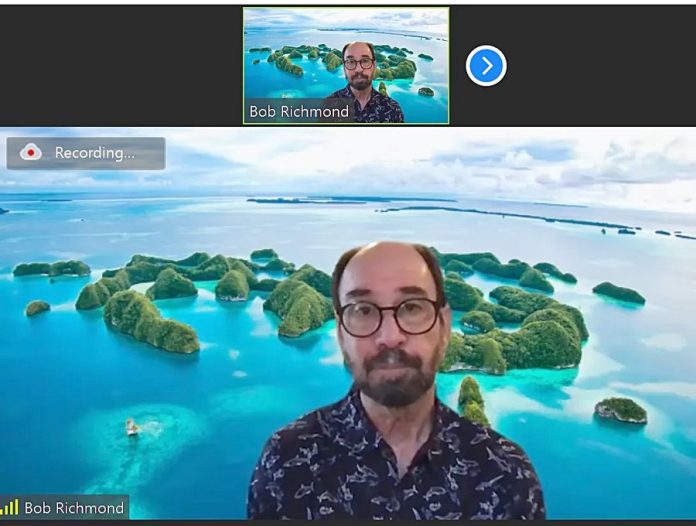A year since Japan announced plans to dump treated Fukushima wastewater into the Pacific Ocean starting in 2023, a group of five independent experts wants those plans to be put on hold while more information is shared.
One of the five experts, Dr Robert Richmond of the University of Hawaii said, “There is this time element that’s being pushed over release in early 2023. And at this point, we’re unanimous in saying we don’t see enough information to even allow that to be considered at this point. Our first recommendation to the group is take that off the table.”
Japan has argued that lack of space at the Fukushima facility is forcing the decision to begin the dumping of the treated water into the Pacific. “But all you have to do is do a Google search of the area, and you can see there’s lots of areas outside the fence where they could put additional tanks,” Dr Richmond explained, “—and you can’t pull it back once it’s released, it’s in the water.”
He also noted how the Our Oceans Conference has highlighted the Pacific priority of decisions driven by a sense of the future generations. “The decision we might make today, like the releases of Fukushima water might be expedient. And it might be cheaper now, but it could have a long-term cost for generations to come. And that’s another thing that we’re very sensitive to, especially in the Pacific Islands– the responsibility to look after the needs of our children, our grandchildren, and generations after that,” he said.
“This is not the first nuclear incident, and it won’t be the last, and so our concern also is, can this challenge be turned into an opportunity?” he told the online briefing.
“This is truly a trans-boundary issue. Fish don’t respect political lines, and neither do radionuclides or any pollutant in the ocean…And I really credit and commend the members of the Pacific Islands Forum for recognising that this is an issue that they need additional information on,” he shared with the virtual briefing. The briefing was one of four online sessions convened by Island Times for journalists across the Pacific unable to attend the Our Oceans Conference due to pandemic impacts on travel.
Dr Richmond, Research Professor and Director at the Kewalo Marine Laboratory in the University of Hawaii at Manoa, is one of five global experts secured by the Pacific Islands Forum to provide independent technical advice into their ongoing dialogue with Japan officials and representatives of the Daiichi Nuclear Power Plant in Fukushima, where the wastewater has accumulated since the 2011 tsunami.
The other experts are Dr Ken Buesseler, Senior Scientist and Oceanographer of the Woods Hole Oceanographic Institution; Dr Arjun Makhijani, President of the Institute for Energy and Environmental Research; Dr Antony Hooker, Associate Professor and Director, Centre for Radiation Research, Education and Innovation, The University of Adelaide and Dr Ferenc (Jacob Rolf) Dalnoki-Veress, Scientist-in-Residence & Adjunct Professor at the James Martin Centre for Non-proliferation Studies.
Briefings had been held between the Forum, the IAEA, and the Japan-based interests from Fukushima, the power company, and the government, since last year, when the Forum issued statements opposing the announcement from Japan.
By late 2021, the Forum had commissioned the independent expert group to help members understand just what had taken place, and what made dumping the treated water into the North Pacific the only viable option.
“We’re not saying right now that everything is wrong, what we are saying is based on the information that’s been provided so far, we don’t see this as something that is going to be acceptable at the moment. We’ve asked for additional information,” Dr Richmond told journalists. He noted the involvement of the International Atomic Energy Agency, the IAEA, who have so far backed the decision by Japan.
“They have top notch scientists, and we’re not challenging them their credibility, we’re not making any judgments about intention, ill-intention, or good intention. We’re simply doing what scientists should do. And that’s provide adequate and accurate information for decision makers to make sound decisions.”
Dr Richmond admitted the task of understanding the information has been a challenge, even for scientists.
“I think the communication hasn’t been as good or clear as it could be…you need to drop the jargon; you need to be able to put things in terms that people can understand. And it’s not saying that people are smart, or stupid… the jargon of science is a different language,” said Dr Richmond, who teaches science communications as part of his courses.
“We’re going in with eyes open to say, let’s look at things objectively, or analyse the data, look at the options.”
Based on his Pacific experiences and work across the world, including Micronesia and Hawaii, he says, “there’s nothing that can’t be explained to people if you want to. My concern is sometimes we see science used to what we call obfuscate, to confuse rather than clarify, and there’s a big industry, we call it ‘manufacturing uncertainty.’”
“It’s not a matter of fault. It’s a matter of what it is. And so maybe this is an opportunity to try some different things that have never been tried before…. And maybe this could be a learning opportunity to really set the bar for the future of not continuing to use our oceans as the dumping ground,” he said.
SOURCE: ISLAND TIMES/PACNEWS













